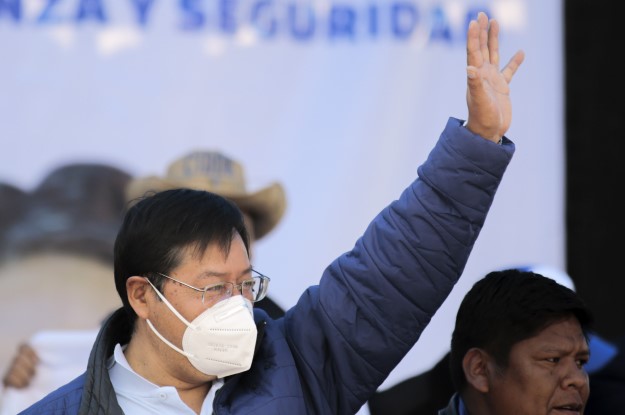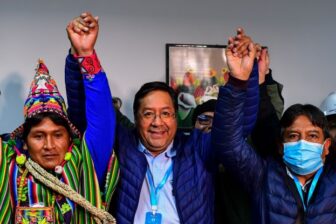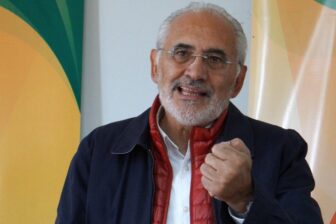A well-functioning, independent judicial system is essential for good governance, accountability, and, ultimately, political stability. The lack of such a system in Bolivia explains many of the serious problems the country has gone through in the last year.
The peaceful October 18 election, however, has opened a new opportunity for the country. When Luis Arce received the presidential sash on November 8, he inherited a justice system in tatters and pliant to those in power. His predecessors, Evo Morales – who remains the leader of Arce’s party, the Movement Toward Socialism (MAS) – and interim president Jeanine Áñez both abused the system to persecute political opponents. President Arce should resist the temptation to engage in revenge justice and instead initiate broad reforms.
The first signs from him are positive. In his first statement after his victory, Arce, who was economy minister for most of Morales’s government, promised “to learn from and overcome our errors.” In media interviews, he cited as an error Morales’ decision to run for a fourth term in 2019 – a decision that became a key factor that led to Bolivia’s political crisis last year. Bolivians had voted to uphold term limits in a 2016 referendum but Morales ran anyway after the Constitutional Tribunal agreed with the far-fetched argument that the term limit violated his human rights.
Arce also said justice “is a debt MAS owes” the people and that the justice system should be independent from politics.
Those are striking statements coming from a MAS leader. In contrast, Morales had called judicial independence a “doctrine” of the United States and of “capitalism.” In fact, during almost 14 years in office, Morales’ administration actively weakened judicial independence.
For example, the 2009 Bolivian Constitution established that high court judges and members of the Magistrates Council, the body that appoints and dismisses judges, would be elected by voters from lists created by Congress. MAS, however, controlled two thirds of the seats in both houses, and ultimately packed the lists with people linked to the government.
In 2017, the majority of the candidates for the three-member Magistrates Council had worked for the Morales administration, and two of them were elected. They remain in their roles.
The opposition warned in 2017 that a main objective of the selection process led by the Assembly was to end up with a Constitutional Tribunal that would permit Morales to run for reelection in 2019. If that was its goal, Congress succeeded.
In 2010, Morales signed a law stripping judges appointed before the 2009 Constitution of their tenure, and retroactively deeming them temporary. The Magistrates Council removed scores of judges without providing any cause and named new judges amid allegations of irregularities. Currently, about 80 percent of Bolivia’s judges remain “provisional.”
During the Morales government, prosecutors filed charges against several of his political rivals in cases that had the hallmarks of being politically motivated.
Things didn’t get better when the political tables turned in 2019. Áñez, an opposition senator who replaced Morales as interim president after he was forced to resign in November 2019, missed a chance to break with the past and ensure judicial independence. Instead, her government publicly pressured prosecutors and judges to further its interests, leading to more than 150 criminal investigations into Morales administration officials or supporters, including Morales himself, for sedition, terrorism or membership in a criminal organization.
Human Rights Watch examined thousands of court documents and police reports in 21 of those cases, and interviewed 90 people, including government officials, prosecutors and defense attorneys. Many of the cases appeared to be politically motivated.
In September, we published a report finding that some people had been charged with terrorism merely for having phone contact with Morales, while others faced charges just for criticizing Áñez online.
The interim government was not subtle in its pressure on the judicial system. Then-Interior Minister Arturo Murillo asked the attorney general to “purge” the prosecutors’ office and warned he would “pursue” judges and prosecutors “who free criminals.” The Áñez administration filed criminal complaints against at least four judges for granting house arrest to people linked to the Morales administration who had been detained awaiting trial. Any judge or prosecutor who made a decision against the interim government´s interests knew they were placing themselves at risk.
After Arce won the election, those same judges started issuing decisions in favor of some former Morales officials. On October 26, a judge rejected the terrorism charges against Morales after finding he had not been properly notified of the proceedings, and thus his right to defense had been violated. We had called for dropping those charges for a substantive reason: The case file, which we reviewed, did not include evidence he committed terrorist acts.
The temptation for some MAS leaders may be to get some form of payback and to go back to the old habit of changing the rules to further the party’s political interests. During their last session before being replaced by representatives elected on October 18, the MAS-controlled Congress changed the threshold of votes needed for some important decisions, such as approving promotions to the top leadership of the armed forces and police, from two thirds to a simple majority. MAS has a majority in the new Congress – but not two thirds.
And so there is a risk that once again, justice will become an instrument of political revenge. The MAS-led Congress passed a law in August that prohibited authorities from traveling outside Bolivia for three months after leaving office. The law arbitrarily infringes on outgoing officials’ right to freedom of movement. On October 20, the then-president of the Constitutional Committee in the Chamber of Deputies, from MAS, threatened to criminally prosecute migration authorities if they let former officials leave the country.
Prosecutors should of course investigate evidence of corruption or other crimes. But Arce should stop any witch hunt.
Arce should also initiate much-needed reforms to ensure judges and prosecutors have job security and clear rules for appointments, transfers, promotions, and removal on the basis of merit.
The goal of such reforms should be to ensure judicial independence, impartiality, and integrity, and thus a justice system where what matters is the rule of law, and not who is in power. That may sound like a dream for many Bolivians right now, and there is no doubt it would be a long process, but Arce has a chance to start Bolivia on that journey. He should take it.
—
Vivanco is Americas director and Acebes is senior researcher at Human Rights Watch.






